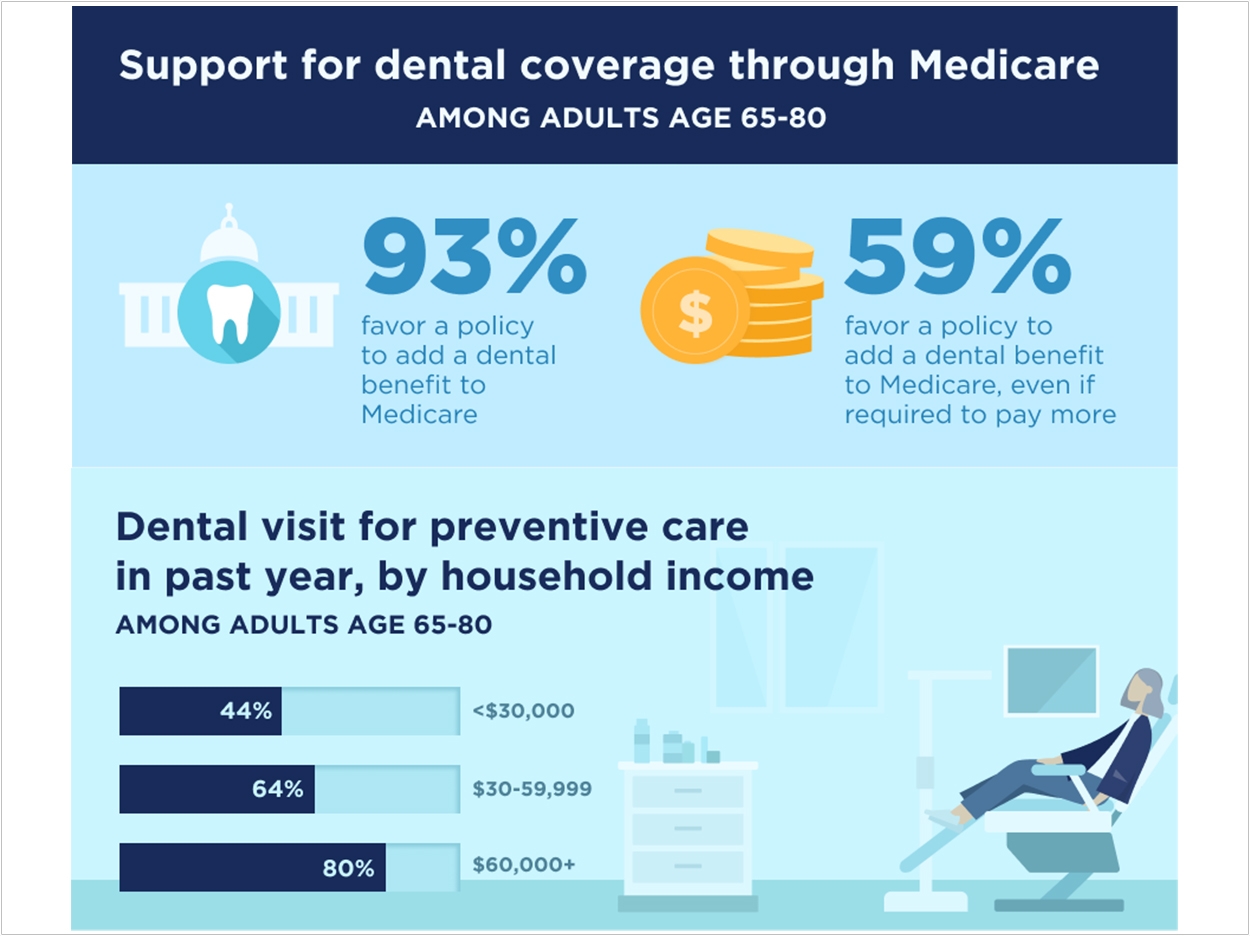
Nearly all older Americans support adding a dental benefit to the Medicare program that covers most people over the age of 65, according to the National Poll on Healthy Aging, which also reveals how often costs get in the way of oral health for older adults.
For example, 93% of people between the ages of 65 and 80 favor including dental coverage in traditional Medicare, though the percentage dropped to 59% when they were asked if they’d favor it even if they had to pay more for their Medicare benefits.
Also, 54% said they currently have dental coverage. Half of this group are covered as employees or retirees or as spouses of employees.
Another quarter said they have dental coverage because they’ve chosen to get their Medicare coverage through a Medicare Advantage plan offered by a commercial insurance company. In fact, the survey said, 72% of those with Medicare Advantage coverage said they’d chosen their plan in part because it covered dental care.
Whether they had insurance or not, cost plays a role in the respondents’ dental decisions, the poll found. One in five of the older adults polled said they had delayed dental care or gone without it in the past two years.
Most respondents said cost or insurance problems affected this decision. Those without dental insurance and those with lower incomes were more likely to say they’d delayed or gone without oral care.
The poll was conducted by the University of Michigan Institute for Healthcare Policy and Innovation with support from AARP and Michigan Medicine, which is the university’s academic medical center. It involved a national sample of more than 1,030 adults age 65 to 80 who answered a range of questions about their own oral health and dental health policy.
“These results suggest that healthcare providers and policymakers should seek solutions to better identify and address how cost and other factors act as barriers to dental care among older adults,” said Domenica Sweier, PhD, DDS, a clinical associate professor at the University of Michigan School of Dentistry.
Sweier helped develop the poll questions and analyze results. Also, she said that as providers and policymakers continue to seek solutions, “This will be important to preventing health and social consequences of unmet oral health needs in this population.”
A previous National Poll on Healthy Aging report looked at dental health, including insurance and cost factors, among people in their fifties and early sixties. Only one in four of those polled said they lacked dental insurance, but half said they did not know how they would get dental coverage after they retired, and some assumed traditional Medicare would cover their dental needs.
“Across the spectrum of ages, dental care and coverage vary, and cost plays a major role,” said Preeti Malani, MD, director of the poll and professor of internal medicine, with special training in the care of older adults.
“We know that poor oral health can affect everything from social interactions to eligibility for surgery, so it’s important for health professionals as well as policymakers to understand what older adults are experiencing,” said Malani.
One in four of the adults over the age of 65 polled, or 27%, said they were embarrassed by the condition of their teeth, and about the same percentage rated their overall dental health as fair or poor.
One in three hadn’t been to the dentist for preventive care such as a cleaning in at least a year. Those with household incomes over $60,000 were nearly twice as likely as those with incomes less than $30,000 to have gone to the dentist in the past year.
Nearly half of the poll sample, or 46%, said they were missing teeth but didn’t have a denture or implant to fill the gap.
“Coverage of dental care, as well as vision and hearing care, is critical for the long-term health of our population,” said Alison Bryant, PhD, senior vice president of research for AARP. “Even simple teeth cleanings may not be affordable to seniors living on fixed incomes, so having coverage for dental benefits may help address that problem.”
The poll also shines additional light on the links between oral health and overall health and well-being, the researchers said. Those who said their overall physical or mental health were fair or poor also visited the dentist’s office less often and were more likely to say their oral health was poor.
Problems with dry mouth related to medication use and challenges eating a healthy diet because of untreated dental problems could make these issues worse, said Malani.
Related Articles
70% of Americans Support Adding Dental Care to Medicare
KFF Outlines Five Solutions for Improving Medicare Dental Coverage
White Paper Calls for Dental Benefits in Medicare Coverage


